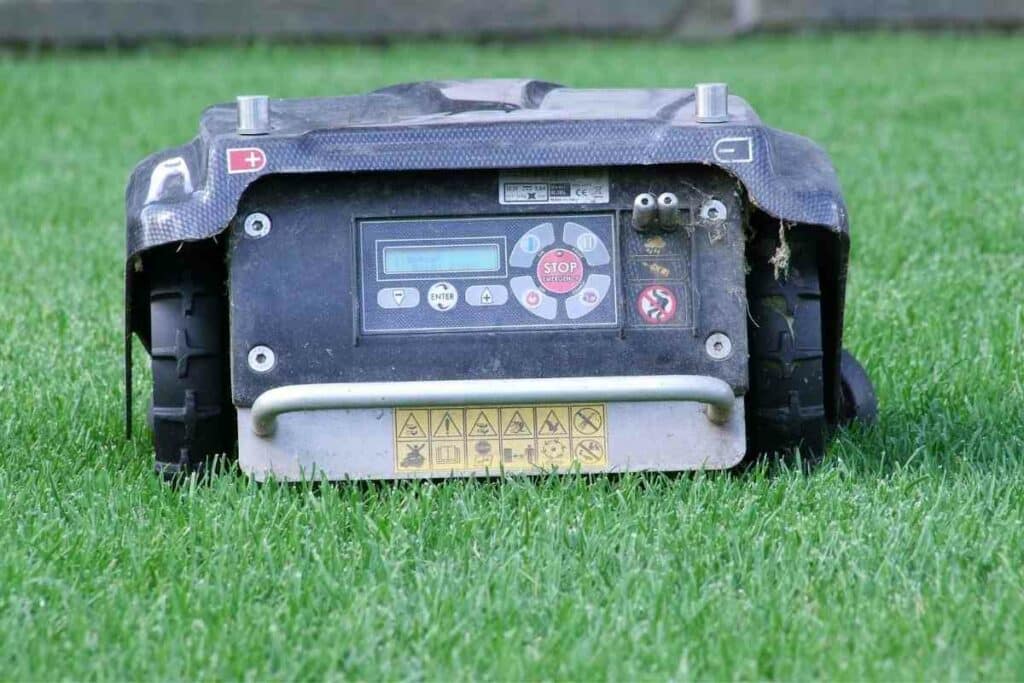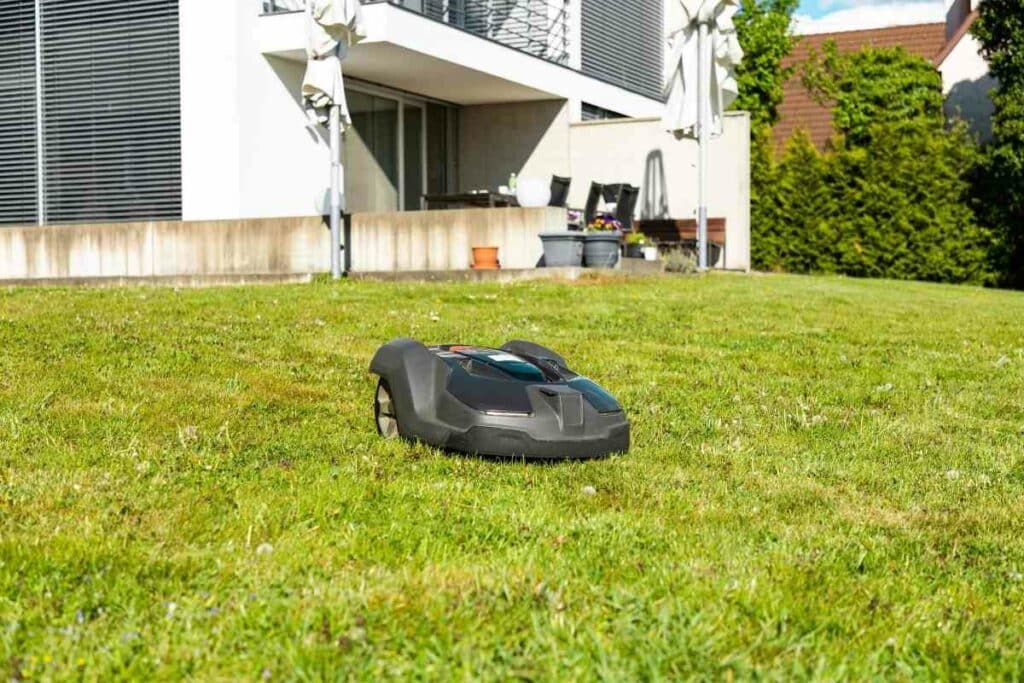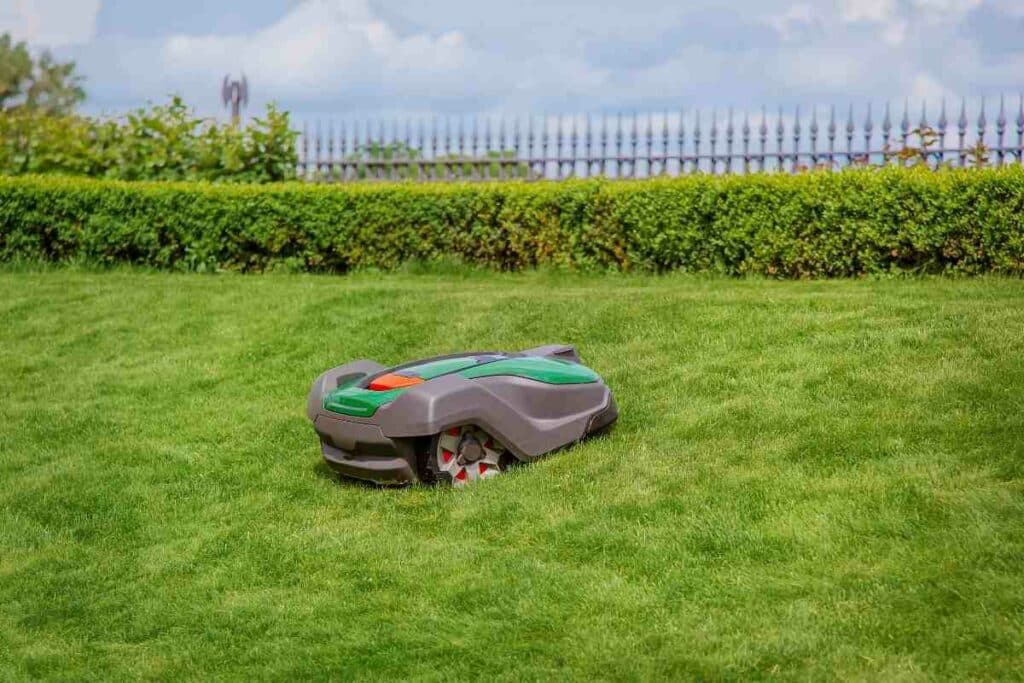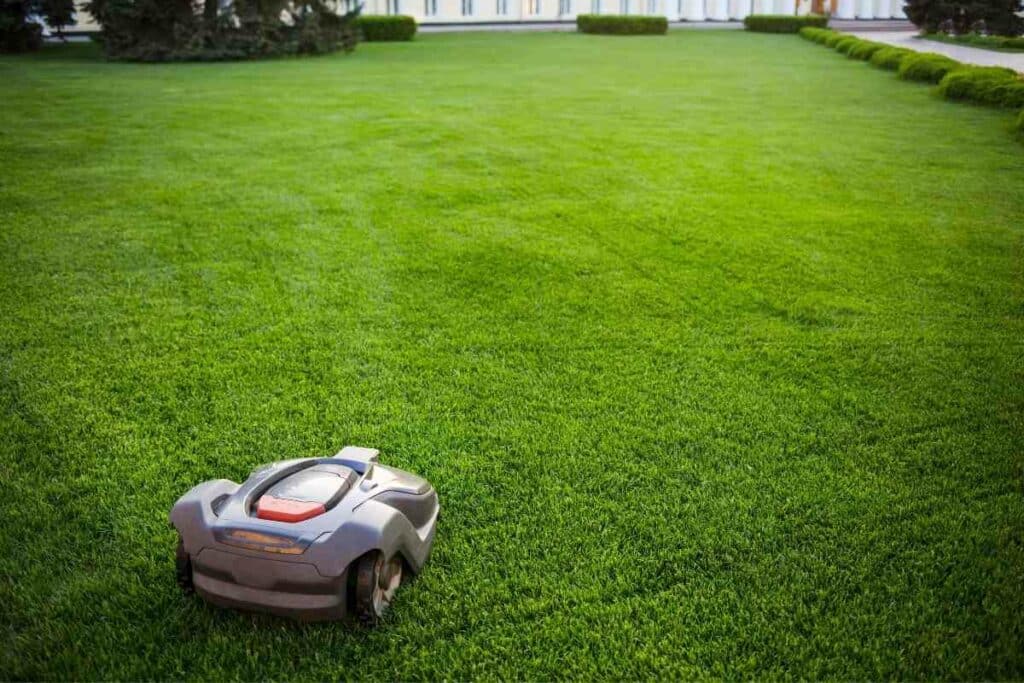When setting up your garden for a robotic mower you may be wondering if the mower will have trouble tackling garden paths or stepping stones.
You may be wondering if you have to lay perimeter wire around them or if the robot can just run right over the path and keep on mowing.

For many owners of a new robot mower not only is the presence of a path a concern, but you may also be worried about your mower running over surfaces like pebbles, slate chippings, or gravel.
In This Article – We’ll explain how your robot traverses garden paths, stone slabs, and other non-grass surfaces in your garden and identify the surfaces that may be a challenge for a robotic mower.
Robotic Lawnmowers Can Go over Paths…but
Robotic mowers are high specification autonomous devices that are engineers to cope with the common challenges of an outdoor environment.
This means that manufacturers build these mowers with the expectation that they will encounter the wide variety of surfaces that are common in the average garden including the ubiquitous garden path.

Garden landscapes can be creative and complex with paving, pebbles, railway sleepers, or other materials separating your lawned areas.
Ideally: You would like your mower to head straight over the path and start mowing the grass on the opposite side, but depending on the type of path, its width, levelness, and overall condition, things may not be so easy.
For Most Solid Non-grass Surfaces of a Short Distance, Your Mower Can Head Right on Over
Autonomous mowers from reputable manufacturers are built to handle varied terrain and can cross sidewalks and driveways in your garden without an issue.
Flat, even surfaces, like paving or stones are no problem and will not harm the blades and underside of the mower.
Creative use of paving slabs can help your mower keep its edges trim as the mower can run onto the slabs and get all of the grass at the edge of your lawn cut effectively.
Uneven Surfaces Present a Challenge for a Robot Mower

Things get dicey when your robotic mower has to take on surfaces that are uneven or made up of little bits of material.
After All – The mower is carrying high-speed pivoting razor blades that items like bark, slate, or pebbles can ricochet off.
The effect of these types of path materials can be unpredictable and may cause the following problems for your robotic lawnmower:
- Ricocheting projectiles: The high-speed blades may contact loose gravel or pebbles that can be flung as speed from the mower causing damage or injury to anything nearby.
- Items becoming caught up in the mowers cutting mechanism: Small stones and debris may even become wedged between the blades or enter the running mower causing damage or outright failure.
- Increase wear and blunting of the blades: Most of these powerful robotic mowers can cope with chopping up natural path materials like chippings or bark. However cutting up these materials not only blunts the blades quickly but also causes increased wears on the motor, reducing its life span.
- The robotic mower can become frankly stuck: Some of these loose path materials may simply be unnavigable for your robot, holding up the mowing of your lawns.
These problems will be worse when the cutting height is very low.
A temporary may be to raise the blades within the mower so that your mower’s blades are well away from the ground.
But this may not prevent your mower from becoming damaged.
Height Differences in Paths Are a Headache for Robot Mowers
Lawn paths are easiest to cross when they are flush with the lawn edge.
If you are laying a lawn path, make sure that your stones are level or create a navigable slope onto and off the stones.
Onboard Features That Help a Robot Mower Go over Paths
Some robotic mowers are simply better at traversing paths than others.

If you want to look for a mower that can handle your garden paths, these features may be helpful:
- A pendulum-suspended mowing deck: suspension of the mowing deck is an advantage for a robotic mower that has to tackle paths and uneven terrain. The mowing deck is not in a fixed position and moves up and down in line with the level of the ground.
- Star-shaped mowing blades: start-shaped blades are more resilient against pebbles and other objects than the individually mounted razor blades.
- Large and rugged wheels: chunky wheels with decent tread, keep the underside of the mower off the ground wont get worn down as the robotic lawnmower moves over uneven terrain.
- Multiple start points: it may be possible to progarm a robot to navigate from a position that avoids your garden path or other obstacles.
Additionally, a reputable brand with convenient access to replacement parts means that if you do run into trouble with your bot, you can purchase quality replacement parts with ease, or take your mower in for servicing with an authorised technician.
Strategies for Avoiding a Garden Path with Your Robotic Mower
Complex lawns are well within the capabilities of a robotic mower, which can usually be tackled in one of the following ways.
Artful Use of Boundary Wire Can Help Your Robot Mower Avoid the Path
Stop your mower from grating itself of nasty gravel paths by leaving them out using your boundary wire.
This will prevent the mower from trying to cross or even mow them.
Turn Your Lawn in to Multiple Separate Mowing Zones
An awkwardly located driveway or unavoidable path that divides your grass can be vetoed permanently by cheating two separate mowing zones for your robot to mow.

It can then be programmed with main and secondary mowing zones that have their own starting point.
You may have to move your mower between the zones.
Create Passages for Your Robotic Mower to Navigate
Create paths and bridges for mowers to get to different areas of your lawn by laying some flat, easily traversable paving stones or creating a passage with boundary wire.
If you create a narrow passage, keep it at least one metre wide to keep the wire signals on either side distinct and prevent signal confusion for your robot.
Rounding Up
As you can see, getting a robotic mower to work effectively in your garden often requires some creative thinking.
If purchasing a robotic mower is part of a larger garden overhaul, why not consider some landscaping adjustments to help your mower out?
You could move the position of your path or lay a flat, level surface for your mower to cross without becoming damaged.
For further advice, why not ask a dealer to test the mower you intend to buy in your garden. Professional installation of boundary wire can also help with complex layouts.
